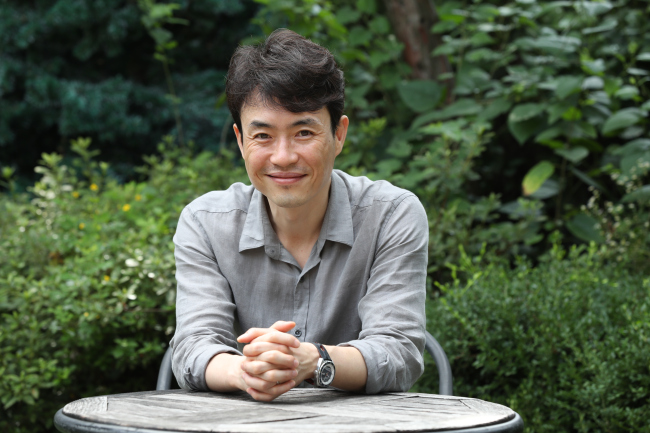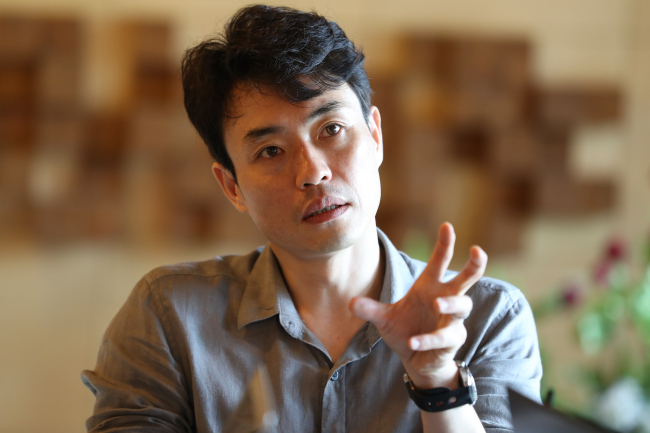[Herald Interview] Ryoo Seung-wan has ‘no regrets’ about ‘Battleship Island’
Veteran director remains confident about his much-debated film that aims to portray oppression in subtle fashion
By Rumy DooPublished : Aug. 6, 2017 - 14:58
“The Battleship Island” is a war flick which deals with the turbulent history of Koreans forced into slave labor by the Japanese on Hashima Island, the site of Japan’s first major undersea coal exploitation. It is also a film that is at the center of a heated public debate.
Some claim it depicts Korean characters as overly villainous in comparison to the Japanese corporate executives who held them captive. But the film’s director Ryoo Seung-wan is confident that he and his crew have given their all to the blockbuster, in both the scope of the cinematography and the depiction of accurate facts.
“It took a total of four years to complete the research and shooting,” Ryoo told The Korea Herald at an interview in Seoul’s Samcheong-dong last Thursday.
Finding records that contained an organized account of the events on the island proved a difficult feat, Ryoo said. “Novelist Han Su-san’s ‘Crow’ is the first work of art to try and deal with the subject. It was a challenge to wade through all of the scattered records.”
Ryoo, who debuted as a director in 2000, acknowledges his transition from making more entertainment-focused flicks to features with socially conscious messages. After the 2005 boxing drama “Crying Fist,” the 2006 gangster action movie “The City of Violence,” and the 2010 crime drama “The Unjust,” Ryoo sealed his status as a hitmaker with the 2013 thriller “The Berlin Files.”
Some claim it depicts Korean characters as overly villainous in comparison to the Japanese corporate executives who held them captive. But the film’s director Ryoo Seung-wan is confident that he and his crew have given their all to the blockbuster, in both the scope of the cinematography and the depiction of accurate facts.
“It took a total of four years to complete the research and shooting,” Ryoo told The Korea Herald at an interview in Seoul’s Samcheong-dong last Thursday.
Finding records that contained an organized account of the events on the island proved a difficult feat, Ryoo said. “Novelist Han Su-san’s ‘Crow’ is the first work of art to try and deal with the subject. It was a challenge to wade through all of the scattered records.”
Ryoo, who debuted as a director in 2000, acknowledges his transition from making more entertainment-focused flicks to features with socially conscious messages. After the 2005 boxing drama “Crying Fist,” the 2006 gangster action movie “The City of Violence,” and the 2010 crime drama “The Unjust,” Ryoo sealed his status as a hitmaker with the 2013 thriller “The Berlin Files.”

Several of his films have starred his brother, actor Ryoo Seung-beom.
“He’s still my favorite actor,” the director commented on his younger sibling, who is currently residing in Spain. “We should make another film together in the future.”
Director Ryoo’s 2015 action-ridden satire of Korea’s affluent chaebol culture “Veteran” sold over 13 million tickets and became the third best-selling movie of all time in Korea. But Ryoo says he feels little pressure to live up to his past films, both in terms of social message and tickets sold.
“I’m the kind of person who only pursues stories that I’m dying to tell, the stories that will drive me crazy if I don’t tell them,” said Ryoo. “I’m glad when the public can see different sides of me through my films, but I’m very bad at calculating my career steps or things outside of the artistic aspects.”
“The Battleship Island,” starring A-listers Hwang Jung-min, So Ji-sub and Song Joong-ki and a massive set recreating Hashima Island’s coal mines, is Ryoo’s priciest undertaking yet, with a budget of 22 billion won ($ 19.5 million). But Ryoo says that any set, whether large- or small-budget, always runs short on funds. The astronomical amount, on the other hand, simplified the filmmaking process, allowing him to focus entirely on what he wanted to achieve artistically.
“Because the amount was something I couldn’t get my head around, all other thoughts escaped my mind. Rather, I figured it was an opportunity that I might never have again. It made me focus on the essence of the film. It was a huge venture for the Korean film industry as well. ... I concentrated only on what kind of situation, characters and sounds I wanted to create.”

Ryoo said he had been driven by a sense of duty to raise awareness of a deeply atrocious, but less publicized, historical subject.
He had first learned about the existence of Hashima Island and its history in 2013. “I felt so embarrassed. I couldn’t believe I hadn’t known about it until after my 40s.”
The controversy over the film’s historical stance baffles him all the more because he had meant to tread carefully around sensitive historical subjects.
“The coal mine was closed down in 1974 but it is still something that is very ongoing for the survivors that suffered there. We didn’t want to do them wrong.”
Much attention was paid to the detail of the workers slaving away 1,000 meters underground in the coal mines, Ryoo said.
“Down there, the heat was so intense people literally could not keep any piece of clothing on. We made (the actors’) skin shiny due to the continuous sweat and underground water, mixed with dirt and heat.”
The colonizers’ tyranny is expressed in a more subtle way, Ryoo remarks.
“In the movie, the Japanese never directly harm or get angry at the Joseon workers,” said Ryoo. “It’s the basic rule of colonization -- to create a collaborator among the oppressed, and create strife among the colonized.”
“The Battleship Island” opened in local theaters on July 26. It was released in the US and Canada on Aug. 4.
By Rumy Doo (doo@heraldcorp.com)








![[KH Explains] Hyundai's full hybrid edge to pay off amid slow transition to pure EVs](http://res.heraldm.com/phpwas/restmb_idxmake.php?idx=644&simg=/content/image/2024/04/18/20240418050645_0.jpg&u=20240419100350)






![[From the Scene] Monks, Buddhists hail return of remains of Buddhas](http://res.heraldm.com/phpwas/restmb_idxmake.php?idx=652&simg=/content/image/2024/04/19/20240419050617_0.jpg&u=20240419175937)

![[KH Explains] Hyundai's full hybrid edge to pay off amid slow transition to pure EVs](http://res.heraldm.com/phpwas/restmb_idxmake.php?idx=652&simg=/content/image/2024/04/18/20240418050645_0.jpg&u=20240419100350)

![[Today’s K-pop] Illit drops debut single remix](http://res.heraldm.com/phpwas/restmb_idxmake.php?idx=642&simg=/content/image/2024/04/19/20240419050612_0.jpg&u=)